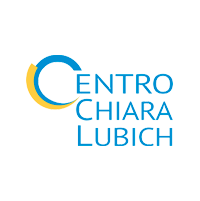Biography of Igino Giordani
Igino Giordani was born in Tivoli; he was the eldest of six children of Mariano and Orsola Antonelli, a working class family
he started primary school;
when he was a little older he helped out at his father’s job during free time and summer holidays
he finished primary school and did a two-year apprenticeship with his father. He studied French through a home course. He later learned Spanish, Portuguese, Rumanian, English, German, as well as Greek and Latin.
with the help of a benefactor, who paid his school fees, he was able to enter the Diocesan Seminary in Tivoli and remained there until 1912
he obtained his High School Certificate and also won a sponsorship given by the Ministry of Law and Justice. He joined the Faculty of Arts and Philosophy in the University of Rome
he was recruited for military service and was sent to a cadet school at Spoleto and then to the Military Academy of Modena. In December he was sent to the front at Isonzo as Sub-Lieutenant of the 111th Infantry
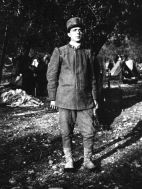
together with his battalion he reached Mount Zebio on the plateau of Asiago
July 7th – wounded in his leg and right hand during a war offensive, he was awarded a silver medal. For three years he was transferred from one hospital to another, from the Baggina (the Trivulzio Pius Institute) in Milan to the military Hospital at the Queen Margaret Palace in Rome, where he also prepared for his university exams
July 12th– on completion of his thesis entitled “The Comical in Dante”, he received his university degree
he began to teach literature as a part-time lecturer at the R. Liceo Ginnasio Umberto I of Rome. He worked there until 1921
his first articles were published in Tivoli and Rome (1918-1920), as was his first booklet (on archaeology)
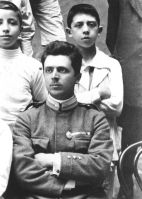
February 2nd – he married Mya Salvati in Tivoli; they subsequently moved to Rome
in autumn he met Sturzo and joined the People’s Party. In October of that year he wrote his first articles about politics for the People’s Party weekly “Il Popolo Nuovo”. He became editor in 1924

having won a sponsorship for teachers, he was able to resume teaching literature at the R. Ginnasio of Nuoro
January – he resigned from his secure teaching post and returned to Rome to take up a position as clerk and journalist at the Italian People’s Party Press Office
April – once the magazine “Il Popolo” was founded by Giuseppe Donati, Foco collaborated wholeheartedly by contributing articles vigorously denouncing a certain kind of political action, so much so that the magazine was eventually suppressed
he taught at the “Cicerone” High School and for the following two years at the “De Merode” Technical Institute and the “Mamiani” High School
July – he became director of the Press Office of the PPI (Italian People’s Party) and its official newsletter “Il Popolo Nuovo”
January – he was editor of the “Bollettino dell’Ufficio Stampa del PPI” (the Italian People’s Party Press Bulletin) which was often confiscated. The last edition was issued in October 1926
June – His book, “Rivolta cattolica” (The Catholic Revolt), was published
Together with Giulio Cenci he was founder and editor of the monthly magazine “Parte Guelfa” (only four issues were eventually published)
February – he was taken to court for publishing political views against the government, but was exonerated due to his service in the First World War
August – he became director of the “Bollettino bibliografico di scienze sociali e politiche” (Bibliographical Bulletin of Social and Political Sciences)
September – his first son, Mario, was born. Then came Sergio in 1929, Brando in 1931 and Bonizza in 1937
November – on the 9th of November the Italian People’s Party was dissolved.
He held a teaching post at the high school of the Cabrini sisters in Rome until 1930. He was later school principal there from 1959 to 1967
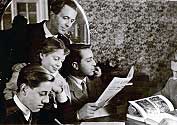
August 20th – the Vatican Library sent him to the United States to attend courses for librarians and bibliographers. He studied in Ann Arbor, Michigan, and New York. He returned to the United States in 1938 to participate in a congress for Catholic librarians in Missouri; in 1966 he attended conferences organized by the Italian Institute of Culture
during his stay in the United States, Foco wrote various articles for the magazine “Commonweal” and also sent articles to Italy for publication in “Carroccio” and “Avvenire d’Italia”. He also wrote books on Protestantism and on North American literature
June 8th – he returned to Italy; in July he started to work at the Vatican Library, a position he would hold until 1944. He was given the task of renewing the library’s cataloguing system
October 2nd – he received a letter from Alcide de Gaspari, who had just been released from prison. Foco helped him find a job at the Vatican Library
April – his first two articles were published in “Fides”, a monthly Vatican publication for the preservation of the Catholic faith. In 1930 he was assistant editor of the magazine until he was officially offered the position of editor in 1932. He widened the magazine’s objectives thus increasing its popularity, especially among the clergy
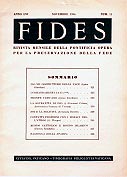
Piero Bargellini invited him to write some articles for the Florentine magazine,
“Il Frontespizio”. He collaborated with him until 1939
he published “Segno di Contradizioni” (Sign of Contradiction) one of his most translated books and the one with the most editions
(the 5th edition was published in 1964)
he founded and directed the Technical School for Librarians at the Vatican Library
He published “Il messaggio sociale di Gesù” (The Social Message of Jesus), the first in a series of books that Lagrange defined as “fundamental to the social study of Christianity”.
The other books in the series were published in 1938, 1939 and 1946.
In 1958 these books formed a collection entitled “Il messaggio sociale del cristianesimo” (The Social Message of Christianity). Some parts have been translated in Chinese and Japanese. The 8th edition was published in 1963.

during the 2nd World War, he worked with De Gasperi, Bonomi and other anti-fascists to prepare for the birth of Italian democracy
The 2nd edition of his book “Catholicism” was removed from circulation by the regime’s authorities. Subsequently, a new censured edition was allowed to be published
April 24th – Mons. Montini appointed him as Director of the School of Journalism and also as a lecturer at the “Scuola di Preparazione Sociale” (School for Social Preparation) at the Lateran University
June 11th – after the liberation of Rome, the new daily newspaper of Catholic Action “Il Quotidiano” (The Daily) was published.
Giordani was involved in its establishment and became its editor from 1944 to 1946
June 2nd – he was elected as member of the House of Representatives for the region of Rome at the Constituents’ Assembly
August 1st – He succeeded Guido Gonella as director of the newspaper
“Il Popolo” (The People)
November – he was elected Councillor for the city of Rome
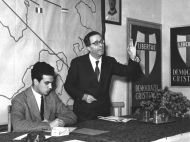
February – he participated in a meeting in Switzerland with other representatives of 8 democratic countries. There he proposed that political parties with ideologies founded on Christian social doctrine should join together in a pact of cooperation.
he was present in Spain for the celebrations of Jaimes Balmes, and travelled to France where he met Gilson and Aron
April 18th – he was re-elected to the House of Representatives
April 21st- 28th – as a representative of Italian Catholic Action, he participated, in London, in a meeting of “Christian Action”, a movement of Christians of all denominations and countries whose aim was to give a Christian soul to the Union of West European States
September 17th – he met Silvia (Chiara) Lubich at Montecitorio, seat of the Italian Parliament
December – he was invited to Lisbon by the newspaper “Novidades” to hold a conference, in Portuguese, on “Catholic Journalism”. He visited Salazar
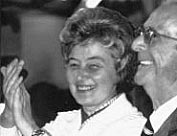
January 29th – in Rome, he founded the weekly magazine
“La Via” (The Way). The publication continued until May 1953
March 16th – he spoke at the House of Representatives on the Atlantic Treaty, to which Italy adhered, proposing it as an instrument of peace and not war
July 11th-29th – at an international course of political studies sponsored by the Fribourg University of Switzerland, he lectured on the European crisis
October 3rd – together with Hon. Calosso, he introduced the first proposal for a law regarding conscientious objectors
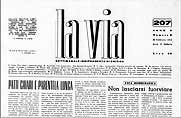
he was nominated a member of the European Peoples’ Council at Strasbourg
December 21st – in the House of Representatives Foco intervened on the Glavi proposal concerning the Korean War. He invited the Italian government to become a mediator between the United States and the communist block in an effort to stop the war. In Parliament he proposed a new philosophy: “If you want peace, prepare for peace.”
October 10th – he intervened in the House of Representatives against the spending on armaments; he proposed a politics of reciprocal love: “even communists are brothers whom we must love”.
October 26th – together with a few other ministers of various political parties, he promoted “parliamentary support in favour of peace”. This earned him a great deal of criticism by his own party
“La divina avventura” (The Divine Adventure), the first publication on the spirituality of the Focolare Movement
June – he was not re-elected to the House of Representatives
as President of the ONARMO Institute for Social Assistance, he contributed to the “Notiziario ONARMO” (The ONARMO Newsletter) focussing especially on “Il cappellano del lavoro” (Chaplains in the workplace), from December 1953 until late 1960
he worked as a library consultant in the Library at the House of Representatives where he introduced a new system of cataloguing. He remained there until 1961.
he taught Christian Social Thought at the International University “Pro Deo”
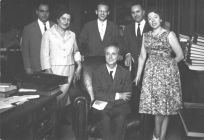
he became editor of the magazine “Città Nuova” (New City)
together with Chiara Lubich he founded the Centro S. Caterina (St. Catherine’s Centre)
the Canossian Sisters invited him to visit their missions in Asia
he published “Le due Città” (The two Cities) expressing the maturity of his political and religious thinking
July – he directed the weekly magazine “L’Unione” (The Union) which was an instrument of the Social Christian Centre
(1961-1962)
he was appointed director of “Centro Uno” (Centre for Christian Unity), the Focolare Movement’s Secretariat for Ecumenism
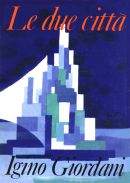
the magazine “Fides” which he directed until its end ceased publication
he was a member of the Superior Council for Public Education until 1966
he published “Laicato e sacerdozio” (Laity and Priesthood), a clear anticipation of the theology of the laity expressed by the Second Vatican Council
he was nominated Director of the International Institute “Mystici Corporis” at Loppiano (Florence)
after the death of his wife Mya, he went to live in a Focolare Centre near the Mariapolis Centre at Rocca di Papa. He participated in the life and activities of the Movement: he spoke at meetings of all the branches of the Movement and also at ecumenical gatherings; he nurtured special relationships with the youth; he wrote his last books including “L’unico amore” (One and Only Love), his memoirs and others still unedited; he continued to write for “Città Nuova” (New City), until December 1979
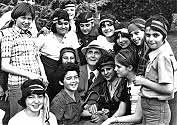
he was present at the ceremony in London when Chiara Lubich was awarded the Templeton Prize
April – his book, “Il diario di fuoco” (Diary of Fire), was first published
April 18th – his life on earth came to an end
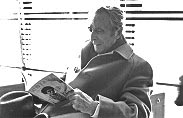
his autobiography “Memorie di un cristiano ingenuo” (Memoirs of an Ingenuous Christian) was published


